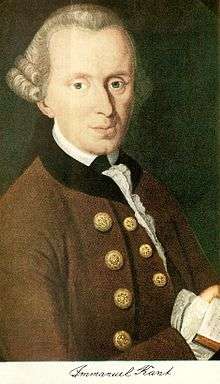The Metaphysics of Morals
.jpg) The German edition | |
| Author | Immanuel Kant |
|---|---|
| Original title | Die Metaphysik der Sitten |
| Translator | Mary J. Gregor |
| Country | Germany |
| Language | German |
| Subject | Ethics |
| Published | 1797 |
| Media type | |
| Part of a series on |
| Immanuel Kant |
|---|
 |
| Major works |
|
|
|
|
| People |
|
|
| Related topics |
The Metaphysics of Morals (German: Die Metaphysik der Sitten) is a 1797 work of political and moral philosophy by Immanuel Kant.
Summary
The work is divided into two main parts, the Rechtslehre and the Tugendlehre. Mary J. Gregor's translation (1991) explains these German terms as, respectively, The Doctrine of Right, which deals with the rights that people have or can acquire, and the Doctrine of Virtue, which deals with the virtues they ought to acquire.
Rechtslehre has also been translated as the Science of Right (Hastie) or the Metaphysical Elements of Justice (Ladd). It is grounded in republican interpretation of origins of political community as civil society and establishment of positive law. Published separately in 1797, the Doctrine of Right is one of the last examples of classical republicanism in political philosophy.[1] The Doctrine of Right contains the most mature of Kant's statements on the peace project and a system of law to ensure individual rights.
The Doctrine of Virtue develops further Kant's ethical theory, which Kant first laid out in the Groundwork of the Metaphysics of Morals (1785). Kant particularly emphasizes treating humanity as an end in itself; in fact the Kant's retake of the second formulation of the categorical imperative (e.g. Groundwork of the Metaphysics of Morals) makes possible to deduce duties. The duties are analitically treated by Kant, who distinguishes: 1) duties towards ourselves; 2) duties towards others. The duties are: 1) perfect duties; 2) imperfect duties. Kant thinks imperfect duties let a latitudo: i.e., the possibility of choose maxims. The perfect duties instead do not let any latitudo and determine exactly the maxims of actions.
Influence
In the English-speaking world, The Metaphysics of Morals is not as well known as Kant's earlier works, the Groundwork of the Metaphysics of Morals and the Critique of Practical Reason, but it experienced a renaissance in the last few decades through the pioneering work of Gregor.[2]
English translations
Translations of the entire book:
- Kant, Immanuel. The Metaphysics of Morals. Translated by Mary J. Gregor. Cambridge University Press, 1991. ISBN 0-521-30372-9.
- Kant, Immanuel. The Metaphysics of Morals. Translated by Mary J. Gregor. Cambridge University Press, 1996. ISBN 0-521-56673-8.
- Kant, Immanuel. The Metaphysics of Morals. In Practical Philosophy. Edited by Mary J. Gregor. Cambridge University Press, 1996.
- Translated by Anonymous (John Richardson), "Metaphysic of Ethics divided into Metaphysical Elements of Law and of Ethics." 2 vols. (London [Hamburg]: William Richardson, 1799).
Translations of Part I:
- Kant, Immanuel. The Philosophy of Law: An Exposition of the Fundamental Principles of Jurisprudence as the Science of Right. Translated by W. Hastie. Edinburgh: T. & T. Clark, 1887; reprinted by Augustus M. Kelly Publishers, Clifton, NJ, 1974. [introduction and all of part I]
- Kant, Immanuel. The Metaphysical Elements of Justice; Part I of the Metaphysics of Morals. 1st ed. Translated by John Ladd. Indianapolis: Bobbs-Merrill, 1965. [introduction and most of part I]
- Kant, Immanuel. The Metaphysics of Morals. In Kant: Political Writings. 2nd enl. ed. Edited by Hans Reiss. Translated by H. B. Nisbet. Cambridge: Cambridge University Press, 1991. [selections from part I]
- Kant, Immanuel. The Metaphysical Elements of Justice; Part I of the Metaphysics of Morals. 2nd ed. Translated by John Ladd. Indianapolis: Bobbs-Merrill, 1999. [introduction and all of part I]
- Kant, Immanuel. Metaphysics of Morals, Doctrine of Rights, Section 43-section 62. In Toward Perpetual Peace and Other Writings on Politics, Peace, and History. Edited by Pauline Kleingeld. Translated by David L. Colclasure. New Haven: Yale University Press, 2006. [selections from part I, concerning public right]
Translations of Part II:
- Kant, Immanuel, The Doctrine of Virtue. Translated by Mary J. Gregor. New York: Harper & Row Torchbooks, 1964; reprinted by the University of Pennsylvania Press, 1971.
- Translated by James Wesley Ellington, in Ethical Philosophy. Indianapolis: Hackett, 1983 [1964]. [Part II]
- Translated by John William Semple, "The Metaphysic of Ethics." Edinburgh: Thomas Clark, 1836; Reprint editions include 1871, ed. Henry Calderwood (Edinburgh: T. & T. Clark). [Introduction and portions of part II]
References
External links
| Wikisource has original text related to this article: |
- The Philosophy of Law: An Exposition of the Fundamental Principles of Jurisprudence as the Science of Right, full text of the introduction and part I of the Metaphysics of Morals.
- An explanation of the division between the two parts, and what Kant means by virtue.
- Die Metaphysik der Sitten, full German text of the Metaphysics of Morals (from Korpora).
- Book Review of Mary Gregor's 1991 translation of the Metaphysics of Morals, by Steven Palmquist.